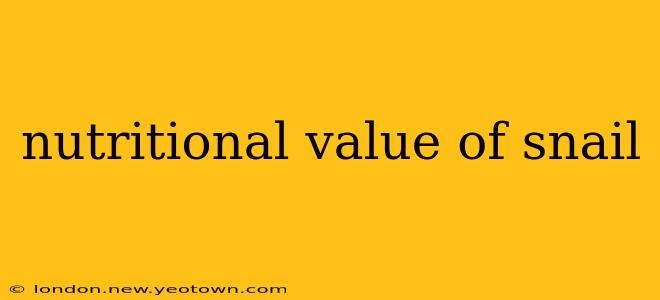Snails. The very word conjures up different images for different people: romantic evenings in France, slimy garden pests, or perhaps even a slightly unsettling texture. But beyond the cultural perceptions and culinary curiosities lies a surprisingly nutritious food source. This isn't just some fleeting trend; snail consumption has a rich history across various cultures, and for good reason. Let's delve into the world of escargot and uncover the hidden nutritional power within these shelled creatures.
What are the Nutritional Benefits of Eating Snails?
Imagine a protein-packed powerhouse, low in fat, and brimming with essential vitamins and minerals. That's the essence of a snail's nutritional profile. They're a complete protein source, meaning they contain all nine essential amino acids our bodies can't produce on their own. This makes them a valuable addition to any diet, particularly for vegetarians or vegans seeking alternative protein sources. Beyond protein, snails are rich in iron, crucial for healthy blood production, and vitamin B12, vital for nerve function and red blood cell formation. They also contain a decent amount of zinc, important for immune function and wound healing, and selenium, a powerful antioxidant.
This nutritional richness isn't simply anecdotal; studies have confirmed the impressive nutrient density of snails. Their nutritional value varies slightly depending on their diet and environment, but the overall pattern remains consistent: a lean, healthy protein source with a significant vitamin and mineral profile.
Are Snails a Good Source of Protein?
Absolutely! Snails offer a considerable amount of protein per serving, making them a viable alternative to traditional meats. This is particularly attractive to those looking to increase their protein intake without relying on red meat. The high protein content contributes to satiety, helping you feel fuller for longer, which can aid in weight management. Remember, protein is essential for building and repairing tissues, producing enzymes and hormones, and supporting overall bodily functions. The bioavailability of the protein in snails is also relatively high, meaning your body can effectively absorb and utilize the nutrients.
What Vitamins and Minerals are Found in Snails?
The vitamin and mineral content of snails is remarkably diverse. As mentioned earlier, iron, vitamin B12, zinc, and selenium stand out. Beyond these, snails are also a source of:
- Vitamin A: Important for vision, immune function, and cell growth.
- Vitamin E: A potent antioxidant protecting cells from damage.
- Magnesium: Essential for muscle and nerve function, blood sugar control, and blood pressure regulation.
- Potassium: Crucial for maintaining fluid balance, nerve signals, and muscle contractions.
- Phosphorus: Important for bone health, energy production, and cell signaling.
This rich tapestry of vitamins and minerals contributes to overall health and well-being, supporting various bodily functions and reducing the risk of certain deficiencies.
How Do Snails Compare Nutritionally to Other Protein Sources?
Compared to other protein sources, snails offer a unique profile. They are lower in fat than many meats, making them a healthier option for those watching their fat intake. While they don't match the high iron content of some red meats, their combination of iron, vitamin B12, and other essential nutrients makes them a well-rounded choice. The precise nutritional comparison will vary depending on the specific snail species and the comparison food, but overall, snails stand as a valuable and often overlooked contender in the world of protein-rich foods.
Are There Any Potential Downsides to Eating Snails?
While generally safe, it's crucial to source snails from reputable suppliers who practice safe handling and preparation methods. Improper handling can lead to contamination with parasites or bacteria. Individuals with shellfish allergies should exercise caution, as there's a potential for cross-reactivity. Also, those who are sensitive to histamine might find that snails, like some other protein sources, could trigger reactions. It's always wise to start with a small portion to gauge your tolerance.
Ultimately, the nutritional value of snails makes them a worthy consideration for those seeking a diverse and nutritious diet. From their high protein content to their rich vitamin and mineral profile, snails offer a unique and delicious way to enhance your culinary experience and your overall health.

